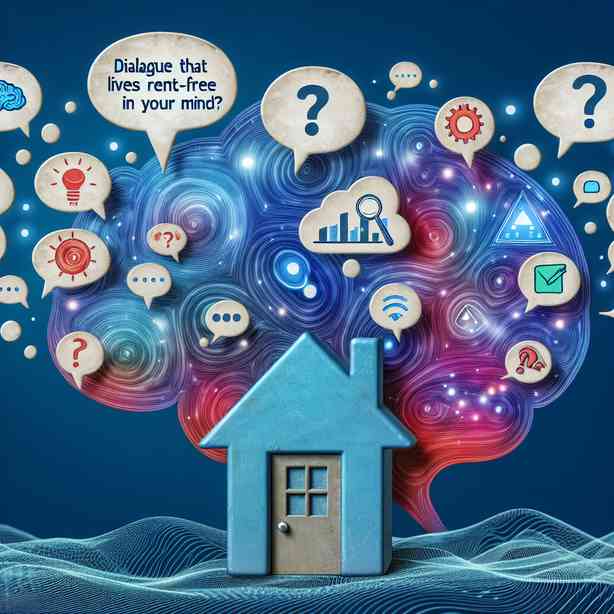
Dialogue that Lives Rent-Free in Your Mind
Dialogue often serves as the backbone of storytelling, whether in films, literature, or everyday life. There are certain lines or exchanges that become etched in our memories, capturing emotions or insights in a way that resonates deeply within us. These dialogues, referred to as “living rent-free in your mind,” can evoke a sense of nostalgia, provoke thought, or even inspire action. They linger in our thoughts like a catchy tune, reflecting the experiences and sentiments we encounter throughout our lives.
One of the most significant aspects of memorable dialogue is its relatability. When characters articulate what we feel but cannot always express, their words tend to stick. This phenomenon is particularly evident in movies and books where characters are beautifully crafted, showcasing human experiences that many can connect with. You may recall a specific line from your favorite film that captured a moment of joy, heartbreak, or realization. It might be a simple goodbye, an unexpected confession, or advice that seems to weigh heavy with meaning.
For instance, consider the quote from The Shawshank Redemption, “Get busy living or get busy dying.” This line doesn’t just belong to a cinematic moment; it conveys a profound truth about life choices that can strike a chord with anyone who’s ever faced a turning point. It encapsulates the essence of making decisions that shape our existence, encouraging active participation in life rather than passive resignation. Such lines become mantras for individuals, resonating with personal experiences and serving as guiding principles in challenging times.
Moreover, dialogue can also capture the complexities of human relationships. Take for example the intricate exchanges between characters in modern literature or television shows. Often, it is during conflicts or emotional reckoning that memorable lines emerge. The way characters argue, reconcile, or find common ground in their communication can resonate with our own relationships, reminding us of familiar patterns in love, friendship, and family dynamics.
For instance, in the acclaimed series Friends, there are countless moments where humorous yet cutting dialogue reflects the true nature of friendships. In one scene, Ross famously exclaims, “We were on a break!” This phrase rapidly became iconic, not just because of the context, but because it encapsulates the complex, often humorous misunderstandings that arise in relationships. Such lines provide a mix of entertainment and insight, allowing viewers to reflect on their own dynamics in a light-hearted yet meaningful way.
Apart from cinema and literature, everyday conversations can also harbor dialogues that stick with us. Think about discussions you’ve had with friends or family — certain phrases or insights may echo in your mind long after those conversations. Perhaps a loved one offered you advice that changed your perspective, or a friend made a joke that perfectly encapsulated an experience you both shared. These snippets of dialogue become markers in our memories, often bringing us comfort or prompting us to think critically about our decisions and emotions.
In professional settings, powerful dialogue can ignite change and inspire action. Leaders and innovators often use memorable phrases during speeches that galvanize audiences. For example, in his famous “I Have a Dream” speech, Martin Luther King Jr. crafted beautiful, evocative lines that still resonate today. Phrases like “the dream deeply rooted in the American dream” evoke a vision of hope, equality, and unity. They haunt our thoughts, driving us to pursue social justice and change within our communities. Such dialogues, whether in political arenas or corporate boardrooms, emphasize the potential impact of well-articulated words.
In addition to their emotional resonance, memorable dialogues often reflect cultural and societal nuances. They capture the essence of the time, providing context that transcends generations. Some quotes become universal, with their meanings evolving as societal values shift. For example, lines from literary classics by authors like Shakespeare or Jane Austen have not only stood the test of time but have also been adapted in various cultural contexts, demonstrating the enduring power of language.
As we navigate our diverse world, it is the dialogues that reflect our struggles, joys, and aspirations that truly resonate. They are the threads that weave our shared human experience. Whether we find inspiration in a motivational speaker, profound insight in a song lyric, or comfort in a friend’s words, these dialogues create connections that outlive the moment they were spoken. They remind us that communication, in all its complexity, plays a fundamental role in shaping our lives.
Reflecting upon this dynamic aspect of dialogue encourages us to pay attention to the words we encounter and the conversations we engage in every day. It reminds us that, as influential as the dialogues we remember may be, it is equally important to be mindful of the dialogues we create. What words are we leaving behind? In our relationships, are we fostering empowering conversations that uplift and inspire those around us?
Ultimately, the dialogues that live rent-free in our minds reflect not only the beauty of communication but also the depth of our shared experiences as human beings. They serve as poignant reminders that while words may be fleeting, their impact can endure; shaping our beliefs, actions, and the way we connect with one another. In a world saturated with information, it is the dialogue that resonates on a personal level that can evoke lasting change, both within ourselves and in the broader societal canvas.
As you continue your journey in life, pay attention to the dialogues that strike a chord within you. Consider keeping a journal of memorable quotes and exchanges that feel significant. Reflect on how they relate to your experiences and utilize them as inspiration during pivotal moments. The power of dialogue is not just in retention but in transformation — how *we* engage with words, both as speakers and listeners. It is this engagement that ensures that certain dialogues will continue to impact future generations, creating an ongoing narrative that connects us through time and space.


